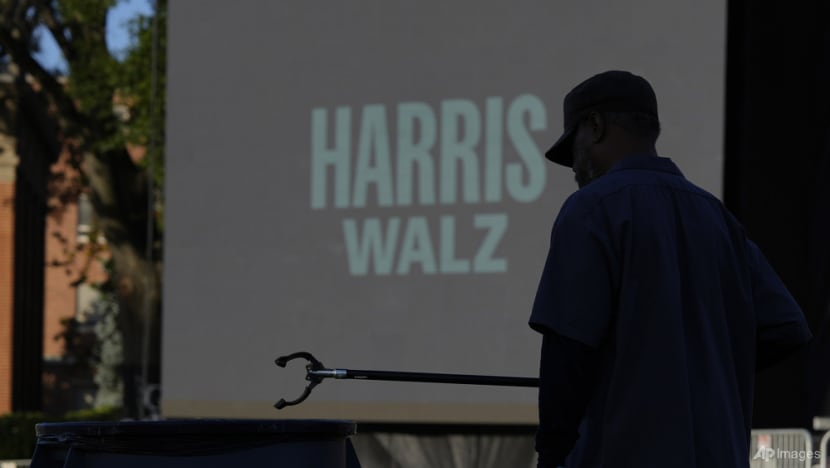Commentary: After Trump’s election victory, the much-needed Democrat infighting begins
Donald Trump’s winning the 2024 US presidential election popular vote shows Democrats need to move back to the political centre to win, says US politics expert Steven Okun.


This audio is generated by an AI tool.
SINGAPORE: Donald Trump will become the next United States president, this time with a win in the popular vote that eluded him eight years ago. But more Americans did not suddenly want to Make America Great Again or put America First.
Donald Trump garnered slightly more votes than he did when he lost in 2020. Kamala Harris received about 10 million fewer votes than outgoing President Joe Biden.
Harris, Biden and the Democratic Party were resoundingly rejected by so many who decided to sit this election out and not vote at all.
“The Democrats are seen by a majority of voters outside of the Northeast and West Coast as a weak party who don’t care about working-class people,” Greg Schultz, 2020 Biden-Harris general election strategist, told me.
As veteran Democratic operative Peter Goelz put it to me: “We are not the party of working men and women - we are the party of fat-cat-out-of-touch Washington labour leaders who cannot deliver their membership.”
“They cling to guns or religion.” “Basket of deplorables.” “Garbage.” “Fascists.” These comments from various Democratic leaders over the past few election cycles, whether in context or not, allowed Trump to exploit the feeling of many Americans that Democrats look down on them.
Of course, Trump freely denigrates Democrats as the "enemy from within", "evil", and "dangerous". No consequence applies going the other way. Trump won due to broad, unprecedented support from a multiracial working-class group of voters.
Unless they focus on policies that promote the working class and respect them, the Democrats will again lose nationally. The Democratic Party brand needs a remake.
SEEN AS PLAYING IDENTITY POLITICS
Why did men without college degrees - regardless of race - move against the Democratic Party this time? Rightly or wrongly, Democrats are not seen as caring about issues of the non-college educated working class.
The Biden-Harris administration had major legislative accomplishments that brought investment and jobs to the US over the last four years and acted to helped working, middle-income people and retirees in other ways, such as by lowering prescription drug costs.
Biden spent four years doing everything he could to ingratiate himself with the unions, including becoming the first sitting president to walk a picket line.
Still, it was offset by policies such as forgiving US$175 billion in student loan debt that was seen as benefiting the college elite and playing identity politics. No wonder white non-college graduates voted for Trump (65 per cent) over Harris (34 per cent).
Democrats are seen as pursing personnel and policies based on a person’s identity, including race, gender and sexual orientation. Regardless of the intent, they are seen as elevating certain groups, changing American culture and causing divisiveness.
In the face of such perception, any nominee would be hard pressed to overcome this.
KAMALA HARRIS COULD NOT BE THE CHANGE CANDIDATE
With only 22 per cent of Americans satisfied with the state of the country, this was a change election.
It was always going to be hard for the incumbent vice president to represent change from her own administration, made harder by Biden’s decision to pull out of the race only after his horrific debate performance this June - and even then, he waited for weeks.
With only 107 days to campaign and no competitive primary race, Harris did not have time to distance herself from a president with historically low approval ratings. Saying she would not have changed a thing that Biden did as president hurt her, especially when it came to the biggest single issue on the ballot - the economy.

The Biden administration recognised US manufacturing workers have been left behind by globalisation and believed free trade agreements have been part of the problem, choosing to pursue “a worker-centred trade policy” to address the damage.
After four years, nothing of consequence occurred under this approach, setting the US further behind in its competition with China.
“What’s a ‘worker-centred’ trade policy? Workers didn’t buy whatever it was, despite non-stop domestic travel to support domestic manufacturing,” commented Dr Deborah Elms, head of trade policy at the Hinrich Foundation.
THE OVERDUE DEMOCRATIC INFIGHTING COMMENCES
The Democratic Party did not have time to run a presidential primary to find a better candidate, if there was one. It forced a show of unity behind Harris. With her defeat, the infighting commences.
Now, the Democrats need to do the same type of soul-searching they did more than 30 years ago.
After nominating northern liberals in 1984 and 1988 and getting a shellacking each time (even worse than Harris did), the Democrats realised if they ever wanted to occupy the Oval Office again, they needed to move to the centre. Enter Bill Clinton, a moderate governor from the southern state of Arkansas who would “put people first”.
Since Barack Obama left office, the Democratic Party has been split between the moderates and the progressives but were able to put aside their differences to jointly oppose Trump.
In 2020, Democrats came together and backed the moderate Biden. However, as Third Way, a US think tank that champions modern centre-left ideas put it, while a moderate Democrat won the presidency, progressives won the White House.
After being elected, the Biden administration shifted its economic policy from a neo-liberal framework to one of pre-distributism, in which government intervenes in the market at an early stage to skew business outcomes, such as Biden’s executive order making non-disclosure agreements illegal.
Now, the Democrats must come to grips that a progressive agenda coupled with a focus on identity politics will keep them in the minority.
We see the battle commencing such as Democratic National Committee Chair Jaime Harrison responding to criticism that Democrats have abandoned working class people as “straight up BS”.
The Democrats need to go back to the drawing board to find a way to win national elections. The country does not want what’s coming from the party’s left.
The 2024 national wipeout should teach the Democrats the same lesson they learned in 1988, after losing a presidential election for the third straight time.
Move back to the centre. Win. Govern from there.
It should not take three consecutive Republican terms for the Democrats to do this. The second term of Donald Trump should be enough.
Steven Okun serves as CEO of APAC Advisors and has lived in Singapore since 2003. He served as Deputy General Counsel of the US Department of Transportation in the Clinton Administration.


















